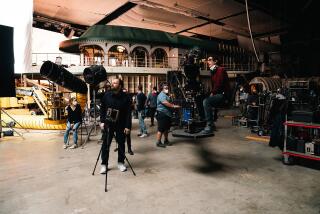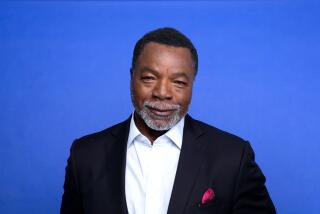‘Shame’s’ Michael Fassbender, Steve McQueen on a serious roll
Actors will endure a lot for a director they believe in. Michael Fassbender swallowed his pride and wore a superhero helmet for Matthew Vaughn in “X-Men: First Class” and toggled trickily between English and German for Quentin Tarantino in “Inglourious Basterds.” But none of that compares to what he’s been willing to go through for Steve McQueen.
Four years ago, when Fassbender began working with the punctilious filmmaker (no relation to that other Steve McQueen) in the prison drama “Hunger,” the actor lost 35 pounds to incarnate Irish Republican Army hero Bobby Sands.
For their latest collaboration, the NC-17-rated “Shame,” Fassbender shed a lot more than weight: He went full-frontal and simulated numerous sex acts — while also improvising scenes shot guerrilla style on New York subway cars — to play a man incapable of emotional connection.
“Why do I want to do all this with Steve?” Fassbender mulled as he sat with the director sipping a glass of wine at a Beverly Hills hotel recently. “Because what’s massively evident and refreshing about [him] is that he has no rule book about making a film. He’ll never rule anything out.”
In a fall film season when anticipated releases come from some of Hollywood’s most reliable names — Spielberg, Scorsese, Eastwood — who are working with familiar talent, McQueen and his star pupil represent a refreshing departure. And with “Shame,” which opens this weekend, they add another notch to their improbable résumés.
McQueen, 42, is a longtime visual artist who kicked up controversy in the British art world before becoming a feature-film director just a few years ago. He is also a rarity for other reasons: a black director making art films about nonblack subjects.
Fassbender, 34, is a German-born, Ireland-raised outsider who toiled in entertainment-world obscurity for nearly 15 years. But in the past year he has become, thanks in part to his collaborations with McQueen, one of the most sought-after talents in Hollywood. His recent run is almost unheard of: Audiences have seen the actor play Rochester in “Jane Eyre,” tackle Magneto in “X-Men: First Class,” incarnate Carl Jung in the new release “A Dangerous Method” and now take up “Shame.” In coming months, we’ll see him as a secret agent in the globe-trotting action thriller “Haywire” as well as star in “Prometheus,” a movie described as a prequel of sorts to “Alien.”
In “Shame” he plays Brandon, a well-to-do Manhattanite afflicted with a crippling addiction. Fassbender’s character craves physical gratification but is frightened of emotional entanglements and has worked out a disturbing routine of prostitutes, Internet porn and one-night stands. In one shocking scene, he sends home a prospective girlfriend (Nicole Beharie) just as they’re getting intimate so he can call a meaningless hook-up. Within seconds, the two have taken their clothes off and are going at it against a floor-to-ceiling hotel window overlooking the Hudson.
In its look at self-destructive behaviors, “Shame” evokes addiction touchstones like “Requiem for a Dream” and “Days of Wine and Roses.” “I made this movie because there’s a situation going on in our culture that wasn’t being spoken about,” McQueen said. “And I wanted to speak about it.”
Combining a moody austerity with sexual frankness, “Shame” generated buzz on the film-festival circuit and won a top acting prize for Fassbender at the Venice Film Festival. But its explicitness, not to mention its quiet pacing, had it heading for a token release until Fox Searchlight, a division of 20th Century Fox that has released unconventional hits such as “Black Swan” and “Juno,” acquired the rights.
The movie has an atmospheric, almost dreamy quality, with a stark visual palette that McQueen conceived with his cinematographer, Sean Bobbitt. It also features what is becoming McQueen’s trademark: extremely long takes. McQueen kept a camera tight on Carey Mulligan, who plays Brandon’s fragile chanteuse sister, for about five minutes while she offers a bluesy rendition of “New York, New York.”
“Steve combines an incredibly creative instinct with an ability to ask ‘Why is something done that way? Why do we have to do it that way?’” said Iain Canning, one of the film’s producers, adding that not every star would go along with that sort of unorthodoxy.
The director and the star actually didn’t hit it off the first couple of times they met. But on their third meeting, in London, they bonded when Fassbender gave McQueen a ride on his motorcycle. “Our ‘Officer and a Gentleman’ moment,” McQueen recalled as the two launched simultaneously into a duet of that movie’s schmaltzy ballad, “Up Where We Belong.”
Waiting for Fassbender
It was several years later that the director his and co-writer, Abi Morgan, started interviewing sex addicts before beginning their screenplay. They also teamed with Canning and Emile Sherman, producers on last year’s best picture Oscar winner, “The King’s Speech.” But the project only crystallized when a certain performer agreed to do it.
Though McQueen said he could have imagined other actors in the role, he said he would have waited years to make it with Fassbender. “Michael can reflect us,” the director, an intensely serious person, said with customary grandiloquence. “We see ourselves in him. He is who we are. We put our face on his face. He is a mirror.”
Both he and McQueen needed a certain amount of elasticity, as well as an improvisational spirit, on “Shame.” The two would sometimes shoot at dodgy clubs, often late into the night. The movie cost just a few million dollars and was shot in only 25 days, nearly unheard of for an award-season contender from a rising star.
Some of the film was also created on the fly. When Beharie, who plays Brandon’s part-time love interest, arrived on set to shoot a scene of her first date with him, she found that the lines she had been studying didn’t matter: McQueen wanted the awkwardness that came from not knowing a script, just like any first date. “I got there and was told ‘We’re not going to use the script, and we’re going to wing it,’” she said.
In other instances, McQueen would provide a single guideline — say, “You can improvise any of the dialogue, but just don’t move from the couch” — and see what the actors would do with it.
“On a big set there are a lot of people involved, so there are a lot of opinions flying around,” Fassbender said. “You do a film that’s $150 million and you have 150 million options. This couldn’t have been more different.”
Shorter and slighter than his on-screen alpha presence would suggest, Fassbender is apt to switch between diatribes about consumerism and the Occupy Wall Street movement (“We’re sold things in a very effective manner; we’re nicely sort of numb”) and a surprising, staccato laugh. That ability apparently helps him on set, where seasoned actors say he can turn on personalities like a light switch.
“One minute he’s Irish Michael Fassbender, joking around with the crew. And the next minute he’s a sex addict,” said costar Mulligan. “And it’s not like he’s some Method actor who goes into a corner. It just happens.”
The serious director
Unlike Fassbender, there’s a seriousness nearly all the time to McQueen, who sometimes brushes aside questions he doesn’t like. Born in London, McQueen has developed a fair amount of fame in the art world. For much of the 1990s he shot black-and-white film installations, some of them starring himself. The 1993 work “Bear,” for instance, featured him and another naked malemodel in what may have been a menacing or romantic pose, while in the 1997 video piece “Deadpan” he wryly reenacted a moment from a Buster Keaton movie.
Having won the art world’s prestigious Turner Prize, McQueen touched off a controversy a few years ago when he created postage stamps featuring the images of servicemen who died in Iraq. He held his ground when some on the right accused him of being unpatriotic and even tried to get the Royal Mail to adopt them as official stamps.
In 2008, he branched out with “Hunger,” about Sands’ 66-day hunger strike in 1981 at Maze Prison, a subject he said fascinated him because of the intersection of politics and sacrifice.
His star took a similarly circuitous route to the film spotlight. Born in Germany to an Irish mother and German father, Fassbender and his older sister moved with their parents to Killarney, Ireland, when the actor was a young boy. He started acting as a teenager — bit parts in television and small films — but remained mostly unknown.
Then he had a few eye-catching turns — one as a predatory family friend in the British coming-of-age drama “Fish Tank.” “Basterds” and “Hunger” landed him on many radars, working with an A-plus list of directors that includes Steven Soderbergh, Ridley Scott and David Cronenberg. In Cronenberg’s “A Dangerous Method,” he plays a different, more restrained character, Carl Jung, a man who would have a field day with “Shame’s” Brandon.
Fassbender and McQueen will team again on the director’s third movie, a slavery drama titled “Twelve Years a Slave” that is being produced by and will costar Brad Pitt and aims to shoot in 2012. The U.S.-based story tells of a free Northern man who is kidnapped and sold into slavery in the mid-19th century.
“I know I’m in a one-percentile position,” Fassbender said. “I guess I’ve spent enough time in the wings to realize when I get a chance to work and do what I love doing that I want to make the ... most of it and not take it for granted.”
Despite Fassbender’s reputation for playing intense types, Cronenberg said he was moved to cast the actor in “A Dangerous Method” because he’s “actually a bit of a jokester” and a “playful Irish boy.”
Indeed, at one point in the interview Fassbender suddenly launched into a “Curb Your Enthusiasm” routine.
“So then he says, ‘No, really, I’m Danny Duberstein, I’ve had a bar mitzvah. I’ve had three bar mitzvahs,’” Fassbender tells McQueen, quoting a scene in which the black comedian J.B. Smoove, playing his street-sharpie character, tries to put one over on actor Michael Richards. “So Richards says: ‘Don’t you only do that when you’re 13?’ And then [Smoove] says, “I do it every 13 years. You’ve got to recharge the mitzvah,” bursting into laughter before he could even get the sentence out.
McQueen looked at the actor intently and, without smiling, declared, “I should cast this guy.”
steve.zeitchik@latimes.com
More to Read
The biggest entertainment stories
Get our big stories about Hollywood, film, television, music, arts, culture and more right in your inbox as soon as they publish.
You may occasionally receive promotional content from the Los Angeles Times.







